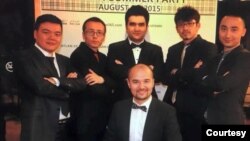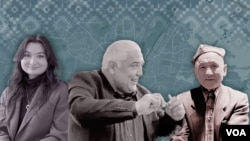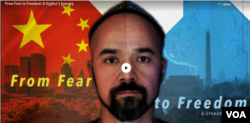Former colleagues of exiled Uyghur journalist Kasim Kashgar have been imprisoned in China’s Xinjiang region, seemingly over their connection to the Washington-based reporter.
Those convicted are Mirkamil Ahmed, Semet Ababekri, Abdukadir Rozi, Mehmut Abdukeyum and Akber Osman. Each has been sentenced to at least seven years in prison, Kashgar said.
Kashgar, who reports for Voice of America, says he learned of the convictions from an acquaintance in May.
At VOA, Kashgar regularly covers Uyghur human rights issues. He believes his former colleagues — who worked with him at the language school he founded in Xinjiang’s capital Urumqi — were targeted due to their association with him.
“Their ‘mistake’ was their past proximity to someone now affiliated with a U.S. news agency covering Uyghur-related news,” Kashgar said.
It’s unclear when the convictions occurred, since the Chinese government rarely publicizes that kind of information. It’s also unclear what the exact charges are.
Kashgar said he learned from sources familiar with the cases that all five were accused of having been recruited by Kashgar to become members of the World Uyghur Congress, or WUC.
Headquartered in Munich, the WUC advocates for Uyghur human rights internationally. But Beijing views it as a separatist organization.
See also: Far from Xinjiang, Uyghurs keep their culture alive
The Chinese government regularly uses bogus charges of separatism and terrorism as an excuse to target Uyghurs, according to human rights groups.
Kashgar said his contact with the WUC is limited to interviews as part of his VOA coverage.
In an emailed statement to VOA, the spokesperson at China’s Washington embassy said, “China is a country ruled by law” where all ethnic groups “enjoy equality.”
“Xinjiang’s judicial organs pursue social fairness and justice, which are the values of the rule of law,” the spokesperson said. The email went on to repeat the common government narrative that Beijing’s policies in the region are for counterterrorism purposes.
Some advocates say the recent convictions underscore the extent of arbitrary detentions in Xinjiang, which many Uyghurs prefer to call the Uyghur Region or East Turkestan.
“It demonstrates that, first of all, this kind of arbitrary detention, and also retaliation by association, has not stopped at all, despite the fact that the government is claiming otherwise,” Zumretay Arkin, the WUC’s spokesperson and advocacy manager, told VOA.
In the region, the Chinese government stands accused by foreign governments and human rights groups of committing genocide and crimes against humanity against the majority-Muslim Uyghur ethnic group. Beijing has long denied any wrongdoing in the region.
Kashgar fled Chinese surveillance and repression in his homeland in 2017 for the United States. He started work for VOA in 2019.
The journalist says he faced Beijing-backed harassment over his work in the form of transnational repression. Earlier this year, he learned from sources that the Chinese government had officially labeled him a “key person involved in terrorism.”
But verifying such information is difficult. Experts say Beijing intentionally makes it difficult to confirm such reports.
See also: From fear to freedom: A Uyghur's journey
The situation involving his former colleagues extends back to March 2021, when Kashgar received a phone call from a childhood friend in Xinjiang.
After being jailed multiple times, the friend had been forced to become an informant for China’s Ministry of State Security intelligence agency, Kashgar said.
Now, the intelligence agency wanted Kashgar to spy for them, the friend said. Kashgar declined.
In the weeks that followed, Kashgar learned that five former employees had been disappeared by Chinese security officials.
Human rights groups estimate that around 1 million to 2 million Uyghurs have been held in the region’s mass internment centers.
Kashgar said he knows of at least seven other former employees arrested in Xinjiang, but it’s unclear whether any of them have been convicted.
This kind of story is common for Xinjiang, according to Arkin. To retaliate against vocal Uyghurs in the diaspora, the Chinese government has a pattern of targeting their family, friends and colleagues who still live in the region.
“This really has been, in my opinion, one of the most successful ways of silencing the diaspora,” Arkin said. “Because you’re facing this constant dilemma, because you’re putting the lives of your relatives, your family and friends at risk, you’re constantly wondering if your work is worth it.”
Arkin said she has heard of other cases of Uyghurs in Xinjiang being questioned over alleged links to the WUC. “It’s used as a tool of fear — inside, but also outside,” she said.
In the diaspora, it’s likely intended to make exiled Uyghurs too scared to be involved with groups like the WUC out of fear of potentially putting their loved ones in Xinjiang at risk, Arkin said.
Learning of his former colleagues’ convictions has taken a toll, Kashgar said.
“It was very difficult to go to sleep and concentrate, focus on anything. It still gives you a lot of stress. But I want to seek justice for them,” he said. “I don’t want to be feeling guilty. But at the same time, there’s some sort of that emotional side that hits me, because those former colleagues never, ever committed any sort of crime.”
A 2022 report by the United Nations Human Rights Office determined that the extent of arbitrary detention of Uyghurs in Xinjiang may constitute crimes against humanity.











